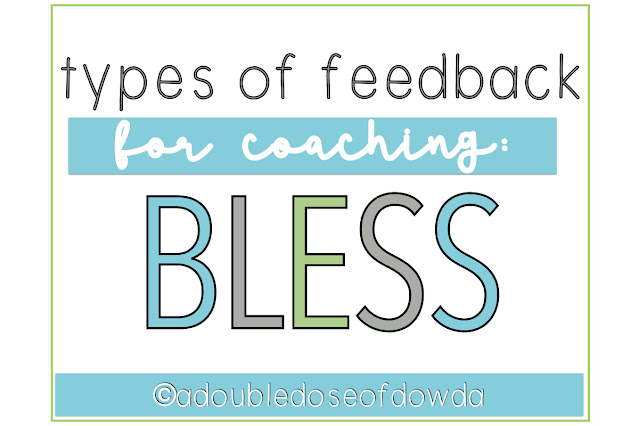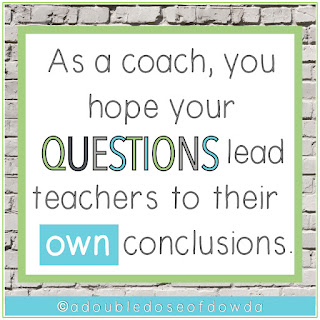It is common for instructional coaches to provide feedback for teachers after classroom observations.
But it can be an awkward conversation if you start giving feedback the teacher isn't ready to receive. That's why "Bless, Address, and Press" is such an important skill to have among your instructional coaching strategies.This post talks about one type of feedback, "Bless," that you can provide to teachers in order to encourage them in the good practices they are already demonstrating and how to use their strengths to improve teaching and learning.
You can certainly use some of these things as a classroom teacher to give effective feedback to students. In this post, however, we are specifically talking about what that looks like for instructional coaching.
What to look for in this post:
- Instructional coach feedback: Bless
- How to bless in instructional coaching if a lesson does not go well
- How to bless in instructional coaching if a lesson goes really well
- Moving forward in the instructional coaching relationship after providing Bless feedback
[0:47] Instructional coach feedback: Bless
If teachers want you to “bless”, it means they want you to give feedback about something they did well. They need a win. They need a little pat on the back. There is nothing wrong with this, as there is so much that teachers do that goes unnoticed. Through a coaching lens, you can recognize those little things and provide feedback on what is going well.In addition, blessing is important even when a teacher has asked you to address (provide feedback on something in particular) or press (provide feedback on something of your choice). It is always good to give a bless somewhere, because everybody needs some positivity.
[2:11] How to bless in instructional coaching if a lesson does not go well
Let’s say you are visiting a classroom and the teacher has asked for you to bless them. You go into that classroom and it is a hot mess. You have a list a mile long of things that need to be fixed. This can be a difficult situation, because having a bad lesson does not mean that the teacher is a bad teacher. Sometimes just reminding teachers of that can be helpful.First and foremost, I always tell teachers that if a lesson doesn’t go well I will never go speak to an administrator about that. It is important to build relationships with the teachers, and they have to know that you are a safe person.
In addition, there is always something going well in a lesson - even if it doesn’t seem that way at first. Maybe the students were well-behaved, or they had great anchor charts posted around the classroom, or the classroom is well organized and has good routines in place. You have to find something and really build up and praise the teacher.
Even with a rough lesson, you should try to capture a positive moment. Maybe the teacher went to help a student, and you can point out how great it was that the teacher got down on the student’s level and spoke with them one on one. You may have noticed that the student responded well and was able to solve the next problem on his own.
[5:01] How to bless in instructional coaching if a lesson goes really well
Now let’s say you go into a classroom when the teacher has asked for you to bless them, and everything runs smoothly. Generally, I have found that those teachers are more interested in address or press, but sometimes they just want the win.If you have built a relationship with that teacher and you know what they have been working on, then I think it is a good idea to pick something related to that and praise them. You can refer back to previous times you have worked with them and the growth they have made in those areas.
Sometimes, it can also be good to bless something they are naturally gifted and talented in as a teacher.
[6:16] Moving forward in the instructional coaching relationship after providing Bless feedback
If you only tell teachers how great they are, they won’t grow. It is, however, a great opportunity to build a relationship with teachers you haven’t worked with very much. In later observations, when they may request an address or a press, you can incorporate what you have blessed into your feedback for the teachers.For example, let’s say you have a teacher who you have blessed about how organized they are and how well they plan a lesson. You may notice that the teacher does not have closure to the lesson, or is not asking strong questions throughout the lesson. In a later conversation, you can remind them how much you like their planning and organization. Then you might say something like, “You did such a great job with planning and being organized and thoughtful with these lessons. What has been your approach to _____ (closure, exit tickets, questioning, etc.)?”
Often, teachers will say that they haven’t given that any thought. As an instructional coach, you just led them to make their own conclusions. Those guiding questions mixed with a bless can be a great way to keep an open conversation.
Check out these related posts:
Giving Students Feedback: Bless, Address, and Press
Check out these related YouTube videos:
Effective Feedback for Students: Bless, Address, and Press
“Address” Coaching Feedback
“Press” Coaching Feedback




No comments
Post a Comment